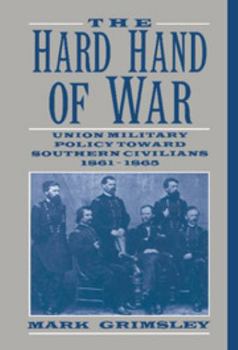The Hard Hand of War: Union Military Policy Toward Southern Civilians, 1861 1865
Select Format
Select Condition 
Book Overview
The Hard Hand of War explores the Union army's policy of destructive attacks upon Southern property and civilian morale--how it evolved, what it was like in practice. From an initial policy of deliberate restraint, extending even to the active protection of Southerners' property and constitutional rights, Union armies gradually adopted measures that were expressly intended to demoralize Southern civilians and to ruin the Confederate economy. Yet the ultimate hard war policy was far from the indiscriminate fury of legend. Union policy makers promoted a program of directed severity, and Professor Grimsley demonstrates how and why it worked. This volume fits into an emerging interpretation of the Civil War that questions its status as a total war and instead emphasizes the survival of political logic and control even in the midst of a sweeping struggle for the nation's future: the primary goal of the Federal government remained the restoration of the Union, not the devastation of the South. Intertwined with a political logic, and sometimes indistinguishable from it, was also a deep sense of moral justice--a belief that, whatever the claims of military necessity, the innocent deserved some pity, and that even the guilty should suffer in rough proportion to the extent of their sins. Through comparisons with earlier European wars and through the testimony of Union soldiers and Southern civilians alike, Grimsley shows that Union soldiers exercised restraint even as they made war against the Confederate civilian population.
Format:Hardcover
Language:English
ISBN:0521462576
ISBN13:9780521462570
Release Date:November 1995
Publisher:Cambridge University Press
Length:258 Pages
Weight:1.00 lbs.
Dimensions:0.8" x 6.3" x 9.4"
Customer Reviews
1 rating
For Specialists Only!
Published by Thriftbooks.com User , 21 years ago
This is a conversion of the author's graduate thesis, composed while he was a student at The Ohio State University. The subject of the study is evident in the subtitle of the book: Union Military Policy toward Southern Civilians 1861-1865. The central theme of the book is that the policy mentioned evolved over time, getting more and more harsh with the civilians that the army encountered. The evolution, however, didn't go nearly as far as some later alleged, and the supposed depredations of the Union army in the various Southern states in the last year of the war are, as far as the author is concerned, mostly exaggerations.This is a good overview of the subject, and the author goes over things with a good analytical eye. I disagree with the other reviewer, who thinks that he's unfairly easy on the Union soldiers who foraged "liberally" during the latter part of the Civil War. I did notice one shortcoming of the book's central argument: the author went over the motivation for attacking things like houses in retaliation for ambushes and attacks against Union troops, but overlooked the possibility that the troops themselves needed to feel that they were somehow retaliating for being attacked. Burning down a house, even if it had no effect on the Southerners who ambushed them, did serve the purpose of making the Union soldiers think that they were doing *something*.This is a thesis, reworked as a book. It's sprinkled with footnotes, and written in a scholarly, dry tone. The result is a lot of information, with interesting and well-reasoned arguments stemming from them, written in rather wooden prose that's not very easy to read. I would recommend this book to hard core Civil War buffs who want to know more about the subject, but only to them.







